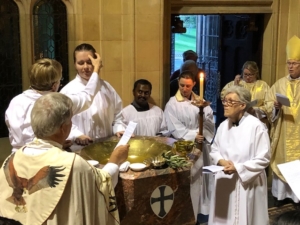Preparation for Baptism
How exciting that you are interested in Baptism. The next step is to contact the Cathedral Office to make an appointment with one of the Cathedral clergy. This will lead to a half hour conversation during which you will be given more information about preparation for this sacrament, and the chance to discuss arrangements.
Baptism (also called Christening) is a community event, welcoming new members of Christ’s flock, and providing opportunity for all the baptised to renew their vows. It should therefore take place withing the regular pattern of congregational worship.
Baptism is one of two great sacraments (holy Communion is the other) of the Christian Church, given to us by our Lord Jesus Christ. Here at St Peter’s Cathedral we rejoice in the opportunity to baptise both children (including infants) and adults. It is a solemn and joyful occasion in response to God’s overwhelming love, marking the formal entry into the Church. Essentially there are three parties to baptism: the person being baptised (represented by parents and god-parents in the case of an infants), the Church as the body of Christ (usually expressed through the local congregation) and God.

Adult Baptism
Adults wishing to explore baptism, confirmation or reception into the Anglican Church from another denomination are invited to speak to one of the clergy. Regular learning opportunities are offered.
The Anglican Church has always baptised adults (and young people able to make their own promises to God and the church). Adults wishing to know more about how to be baptised are encouraged to talk to one of the Cathedral clergy. Adults will usually be baptised at Easter, and should have a sponsor – usually a member of the Cathedral congregation who has traveled with the candidate during a time of preparation.
Infant Baptism
Parents presenting children or infants for Baptism should be baptised themselves and be able and willing to make this commitment on behalf of their child. Regular baptisms are usually held during the 10.30am Sunday services, following a period of intentional preparation.
God-Parents
Along with parents, the god-parents are not legal guardians, but people chosen by parents who they know will pray for the child and support him/her in those all-important formative years – through their own example of regular prayer and worship in the Church.
